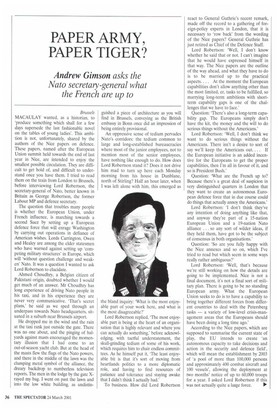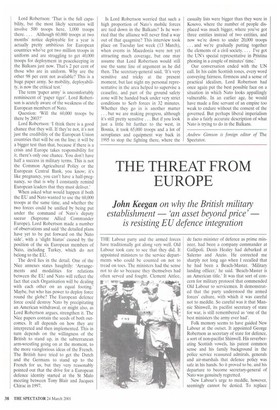PAPER ARMY, PAPER TIGER?
Andrew Gimson asks the
Nato secretary-general what the French are up to
Brussels MACAULAY wanted, as a historian, to 'produce something which shall for a few days supersede the last fashionable novel on the tables of young ladies'. This ambition is not, unfortunately, shared by the authors of the Nice papers on defence. These papers, named after the European Union summit held towards the end of last year in Nice, are intended to enjoy the smallest possible circulation. They are difficult to get hold of, and difficult to understand once you have them. I tried to read them on the train from London to Brussels, before interviewing Lord Robertson, the secretary-general of Nato, better known in Britain as George Robertson, the former Labour MP and defence secretary.
The question that troubles many people is whether the European Union, under French influence, is marching towards a second Suez by setting up a European defence force that will enrage Washington by carrying out operations in defiance of American wishes. Lords Carrington, Owen and Healey are among the elder statesmen who have warned against setting up 'competing military structures' in Europe, which will 'without question challenge and weaken' Nato. It was a question I wanted to ask Lord Robertson to elucidate.
Ahmed Choudhry, a Belgian citizen of Pakistani origin, doubted whether I would get much of an answer. Mr Choudhry has long experience of driving Nato people in his taxi, and in his experience they are never very communicative. 'That's secret plans,' he said as we sped through an underpass towards Nato headquarters, situated in a suburb near Brussels airport.
He dropped me in the wind and the rain at the taxi rank just outside the gate. There was no one about, and the pinging of halyards against masts encouraged the momentary illusion that I had come to an out-of-season yacht club. But at the head of the masts flew the flags of the Nato powers, and there in the middle of the lawn was the clumping metal symbol of the alliance, the dreary backdrop to numberless television reports. The men in the lodge by the gate Xrayed my bag. I went on past the lawn and into the low white building, as undistin guished a piece of architecture as you will find in Brussels, conveying as the British embassy in Bonn once did an impression of being entirely provisional.
An oppressive sense of tedium pervades Nato's corridors: the tedium common to large and long-established bureaucracies where most of the junior employees, not to mention most of the senior employees, have nothing like enough to do. How does Lord Robertson stand it? Does it not drive him mad to turn up here each Monday morning from his house in Dunblane, north of Stirling? Half an hour later, when I was left alone with him, this emerged as the bland inquiry: 'What is the most enjoyable part of your work here, and what is the most disagreeable?'
Lord Robertson replied, 'The most enjoyable part is being at the heart of an organisation that is highly relevant and where you can actually do something,' before acknowledging, with tactful understatement, the skull-grinding tedium of some of his work, which requires him to chair endless committees. As he himself put it, 'The least enjoyable bit is that it's sort of moving from heartlands politics to a more diplomatic role, and having to find resources of patience and tolerance and staying awake that I didn't think I actually had.'
To business. How did Lord Robertson react to General Guthrie's recent remark, made off the record to a gathering of foreign-policy experts in London, that it is necessary to 'row back' from the wording of the Nice papers? General Guthrie has just retired as Chief of the Defence Staff.
Lord Robertson: 'Well, I don't know whether he said that or not. I can't imagine that he would have expressed himself in that way. The Nice papers are the outline of the way ahead, and what they have to do is to be married up to the practical aspects. . . At the moment the European capabilities don't allow anything other than the most limited, er, tasks to be fulfilled, so marrying long-term ambitions with shortterm capability gaps is one of the challenges that we have to face.'
Question: 'There's also a long-term capability gap. The Europeans simply don't have the kit, the money and the will to do serious things without the Americans.'
Lord Robertson: 'Well, I don't think we want to do serious things without the Americans. There isn't a desire to sort of say we'll keep the Americans out.... If the European initiative is an added incentive for the Europeans to get the proper capabilities, then I'm all in favour of it, and so is President Bush.'
Question: 'What are the French up to? Because there's a great deal of suspicion in very distinguished quarters in London that they want to create an autonomous European defence force that in due course could do things that actually annoy the Americans.'
Lord Robertson: 'I don't think they've any intention of doing anything like that, and anyway they're part of a 15-nation European Union and a 19-nation Nato alliance ... so any sort of wilder ideas, if they held them, have got to be the subject of consensus in both organisations.'
Question: 'So are you fully happy with the Nice annexes and so on, which I've tried to read but which seem in some ways really rather ambiguous?'
Lord Robertson: 'Well, that's because we're still working on how the details are going to be implemented. Nice is not a final document, it's not a final sort of military plan. There is going to be no standing European army. What the European Union seeks to do is to have a capability to bring together different forces from different countries to deal with the Petersberg tasks — a variety of low-level crisis-management areas that the Europeans should have been doing a long time ago.'
According to the Nice papers, which are supposed to summarise the current state of play, the EU intends to create 'an autonomous capacity to take decisions and action in the security and defence field', which will mean the establishment by 2003 of 'a pool of more than 100,000 persons and approximately 400 combat aircraft and 100 vessels', allowing the deployment at two months' notice of up to 60,000 troops for a year. I asked Lord Robertson if this was not actually quite a large force. Lord Robertson: 'That is the full capability, but the most likely scenarios will involve 500 troops here, 1,000 troops there.... Although 60,000 troops at two months' notice deployable for a year is actually pretty ambitious for European countries who've got two million troops in uniform and are struggling to get 40,000 troops for deployment in peacekeeping in the Balkans just now. That's 2 per cent of those who are in uniform. Why are the other 98 per cent not available? This is a huge paper army. So mobility, deployability, is now the critical test.'
The term 'paper army' is uncomfortably reminiscent of 'paper tiger'. Lord Robertson is acutely aware of the weakness of the European members of Nato.
Question: 'Will the 60,000 troops be there by 2003?'
Lord Robertson: 'I think there is a good chance that they will. If they're not, it's not just the credibility of the European Union countries that will be on the line; it will be a bigger test than that, because if there is a crisis and Europe takes responsibility for it, there's only one chance. You don't have half a success in military terms. This is not the Common Agricultural Policy or the European Central Bank, you know; it's like pregnancy, you can't have a half-pregnancy, so that is why I constantly remind European leaders that they must deliver.'
When asked what would happen if both the EU and Nato wanted to use the 60,000 troops at the same time, and whether the two forces could be unified by being put under the command of Nato's deputy saceur (Supreme Allied Commander Europe), Lord Robertson made a number of observations and said 'the detailed plans have yet to be put forward on the Nato side', with a 'slight hiatus' caused by the position of the six European members of Nato, including Turkey, which do not belong to the EU.
The devil lies in the detail. One of the Nice annexes states haughtily: 'Arrangements and modalities for relations between the EU and Nato will reflect the fact that each Organisation will be dealing with each other on an equal footing.' Maybe, but who has power to deploy force round the globe? The European defence force could destroy Nato by precipitating an American withdrawal, or might also, as Lord Robertson argues, strengthen it. The Nice papers contain the seeds of both outcomes. It all depends on how they are interpreted and then implemented. This in turn depends on the willingness of the British to stand up, in the subterranean arm-wrestling going on at the moment, to the more vainglorious ideas of the French. The British have tried to get the Dutch and the Germans to stand up to the French for us, but they very reasonably pointed out that the drive for a European defence identity started at the St Malo meeting between Tony Blair and Jacques Chirac in 1997. Is Lord Robertson worried that such a high proportion of Nato's mobile forces are tied down in the Balkans? Is he worried that the alliance will never find a way out of that quagmire? This interview took place on Tuesday last week (13 March), when events in Macedonia were not yet attracting much coverage, but one may assume that Lord Robertson would still use the same line of argument as he did then. The secretary-general said, 'It's very sensitive and tricky at the present moment, but last night my personal representative in the area helped to supervise a ceasefire, and part of the ground safety zone will be handed back under very strict conditions to Serb forces in 32 minutes. Whether they go in is another matter . but we are making progress, although it's still pretty sensitive . . But if you look just a little bit further to the west, in Bosnia, it took 65,000 troops and a lot of aeroplanes and equipment way back in 1995 to stop the fighting there, where the casualty lists were bigger than they were in Kosovo, where the number of people displaced was much bigger, where you've got three entities instead of two entities, and now we're down to under 20,000 troops .. and we're gradually putting together the elements of a civil society. . . . I've got the UN's special representative in Pristina phoning in a couple of minutes' time.'
Our conversation ended with the UN call. In his calm Scottish tones, every word conveying fairness, firmness and a sense of practical idealism, Lord Robertson had once again put the best possible face on a situation in which Nato looks appallingly vulnerable. In an earlier age, he would have made a fine servant of an empire too weak to endure without the consent of the governed. But perhaps liberal imperialism is also a fairly accurate description of what Nato is trying to do in the Balkans.
Andrew Gimson is foreign editor of The Spectator.















































































 Previous page
Previous page